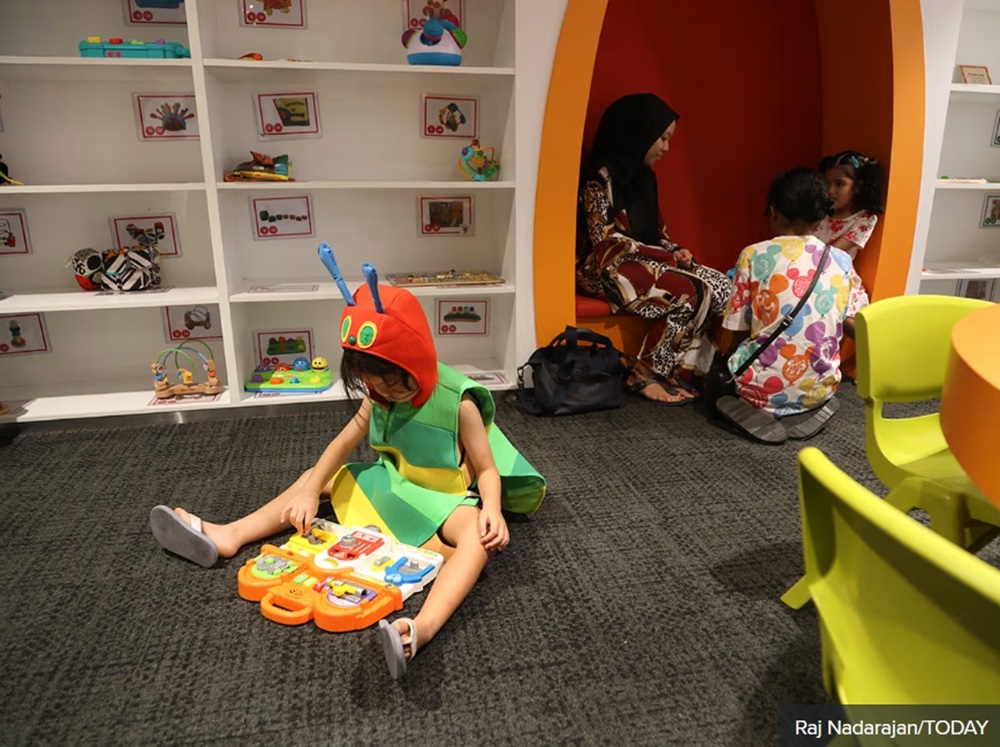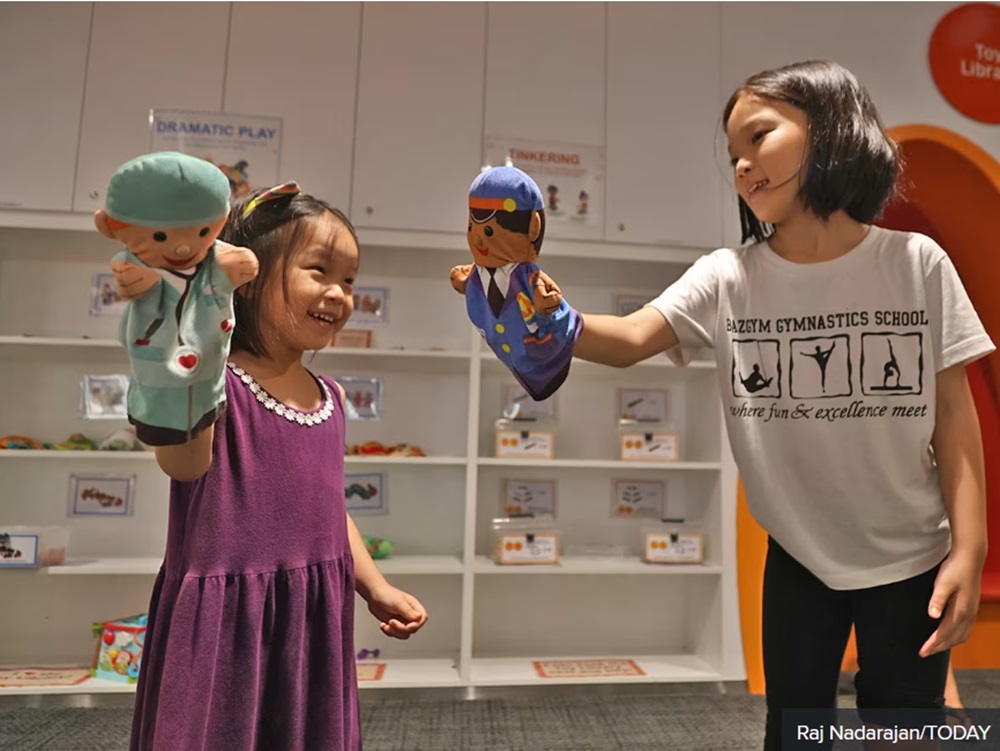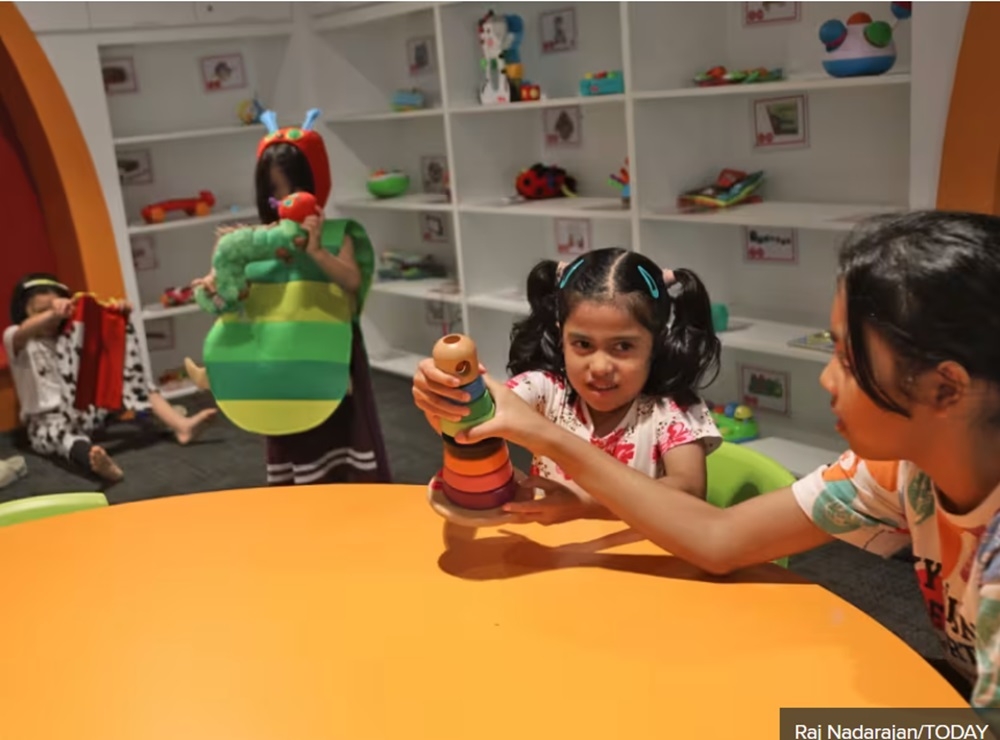SINGAPORE, June 9 — Every week, Summer Chen takes her one-and-a-half-year-old son to a special spot in Punggol Regional Library, where there is a children’s wonderland for him to spend hours tinkering around with various toys and playing with other kids.
Located in a corner of the library’s ground floor, the Toy Library features some 70 educational toys that are meant for kids aged six and under to play with free-of-charge.
He usually gravitates to puzzles or sensory toys, such as an orange-coloured toy board with locks and latches.
Now and then, he summons the courage to interact with other kids — and the toys help to break the ice.
“Since coming here, he has learned to be more social and tries to interact with others,” said Chen, 31, who declined to give her son’s name.
“(This is) unlike when he is at an outdoor playground, where he would keep to himself.”
The valuable social lessons that the place has given to her son is why Chen and her husband are all too willing to commute for an hour each week from their home in Tampines to Punggol by public transport.
Found within the five-storey Punggol Regional Library, which is located at lifestyle hub One Punggol, the Toy Library was opened on January 30 last year by the National Library Board (NLB) as part of Singapore’s first public library to offer a range of services for persons with disabilities.
Since its launch, Punggol Regional Library has welcomed more than 1.3 million visitors, making it the most visited library in 2023. The Punggol estate also has one of the highest proportions of children below five years old in its resident population, according to NLB’s website.
When TODAY visited last month at around 2.30pm on a weekday, there were five families visiting the brightly lit space, which consists of tables for children to play their selected toys as well as small booths for their parents or caregivers to watch over the kids.
However, the toys cannot be loaned out and are only available for play and learning onsite at the library.
The Toy Library is also managed partly by beneficiaries from the Movement for the Intellectually Disabled of Singapore (Minds) who help to sanitise the toys and maintain the cleanliness and tidiness of the space.
Minds is a social service agency serving persons with intellectual disability, caregivers and their families.
Kavita Ilangovan, senior manager at Punggol Regional Library, said: “We want to help young children aged six and below to learn through play as toys are an essential part of play, which comprises creative, dramatic and sensory elements.”
NLB is also continuing to explore opportunities to expand its offerings across the library network, collaborating with “like-minded partners” to maintain and extend the educational benefits of learning through play to more children, she added.

What the Toy Library offers
Apart from regular toys, the Toy Library also features educational aids, puppets, costumes as well as toys with sensory enhancements. Each cater to different types of play, which can be grouped into four categories.
The first is to spur creative play, which aids a child’s motor skills, hand-eye coordination and stimulates brain development.
A second approach is dramatic play, which encourages the child to use his or her imagination to recreate scenes from stories.
Next, some toys encourage sensory play, which develops a child’s fine and gross motor skills, and cognitive growth.
Finally, the library also features tinkering aids, which offer children the ability to experiment and find creative solutions to basic design and engineering challenges with their parents and caregivers.
These toys are selected based on their educational value, developmental benefits, inclusivity and safety in order to cater to a diverse range of interests and abilities, said Ilangovan.
According to Ilangovan, the Toy Library has around 70 educational toys, which include 10 costumes, five sets of puppets, seven sets of tinkering toys, and 48 sensory and creative play toys. They are also changed regularly to provide variety.

Library helps kids cultivate curiosity, say parents
Speaking to TODAY, Chen, an engineer by profession, said she first heard about the Toy Library through a friend who showed her a photo of the location.
The idea piqued her interest when she saw that it was an air-conditioned space with a variety of toys available at no cost.
“Looking for a similar indoor space is a big difficulty as most of them require a fee, so if we can find a free one in the library, it’s great (for us),” she said.
Other parents also lauded the free initiative, adding that its presence helped impart important educational values to their young children.
Suhaila, 35, who declined to give her full name, said it was only her third time at the Toy Library, but she found that the space had offered her a good and interactive way for her youngest daughter to be engaged with literature, as she did not have a long attention span for reading.
She said her older children have become more independent and curious as a result of visiting the library, and she wanted the same for her youngest child.
“(With the Toy Library), my youngest especially, who is six, would venture around the space on her own and be interested to find out more about how different toys work,” she said.
Another parent who frequents the library, Juliana Rasid, 40, agreed that the Toy Library is a great way to introduce her one-year-old son and five-year-old daughter to the library environment of books and reading.
“It is a pre-activity before we move onto books as my children love to play with toys... But there is also a social element to it as they get to interact and play with other children while learning patience,” she said.
Juliana said that her family does not have the habit of buying toys for the children as they might not always be a hit with her children. With the variety of toys available at the Toy Library, however, she is able to observe what interests them most.
Sharing and caring for a free resource
Considering that the toys at the Toy Library are free for all to use, parents said the library also helps to teach the kids about sharing a public good and caring for these toys as if they were their own.
Andrew Tan, 42, a stay-at-home dad who visits the place twice weekly, said he began seeing a positive change in two daughters’ behaviour when it came to sharing toys.
Watching his eight-year-old daughter pull out a princess outfit from a rack of costumes at the Toy Library to dress her four-year-old sister, Tan said with a smile: “They love to share now, because now they know that there are other children who would want to play with the toys and they learn how to give the toys to the younger children.”
On top of that, they have also come to appreciate that toys are valuable as they cost money to buy, and thus toys that are shared among many children at the library deserve to be treated with care.
Said Tan: “They learned that they don’t have to buy toys (for themselves), because there are places where they can share toys (instead).”
He also hopes for the concept to be implemented in more libraries in the future so as to benefit more children by teaching them values and instilling some discipline at a young age.
Though she hopes to see more music-related offerings at the Toy Library, Stephanie Chang, 36, has found the Toy Library to be a great space to explore with her 22-month-old son.
“We are from the UK where libraries host free playgroups for children with toys to play with, but since being in Singapore, we have not found anything like that which is free,” said Chang.
Since visiting the Toy Library, she has noticed that the space provided a great way to reduce wastage of toys and her son is able to try out different toys at different developmental stages without having to clutter the home.
“He certainly loves the space and I find that we can stay longer in the library as we alternate between the books section and the Toy Library,” said Chang.

Maintained by special needs students
In order to keep the Toys Library in good shape for visitors, students from Minds Fernvale Gardens School also take on work attachment opportunities at NLB to help maintain the library.
The school is dedicated to persons with disabilities, aged seven to 18, to stay engage through programmes and learning experiences to develop critical skills while nurturing their interests and talents.
The idea was first conceived back in March 2020 to make Punggol Regional Library accessible to persons with disabilities. Currently, four students undergo the work exposure programme, which takes place weekly between the school’s second and fourth terms, every year.
During school holidays, NLB would take over the maintenance of the Toy Library.
Said the school’s vice-principal Evelyn Soh: “Through this work attachment at Punggol Regional Library, we hope that our students can learn and gain work readiness skills as well as soft skills like time-management to complete assigned tasks independently.
“We also hope that they will pick up independent living skills such as travelling home from the library and finding solutions to the obstacles that they encounter at work.”
Besides sanitising the toys and maintaining the general cleanliness and tidiness of the toy library, the Minds students also attend to visitors’ queries and are trained to approach the library staff for assistance when they are unable to answer the queries.
Since the work attachment began, Soh said that she has observed positive changes in her students as they become more independent in managing themselves, including reporting to work on time.
The students also learned to show care and concern to their peers, look out for one another and offer help when needed.
“Through this collaboration, we hope that the community can better appreciate that persons with intellectual disabilities have the propensity to learn, and with the right support and opportunity, they too can be valued contributors to society,” said Soh. — TODAY






















